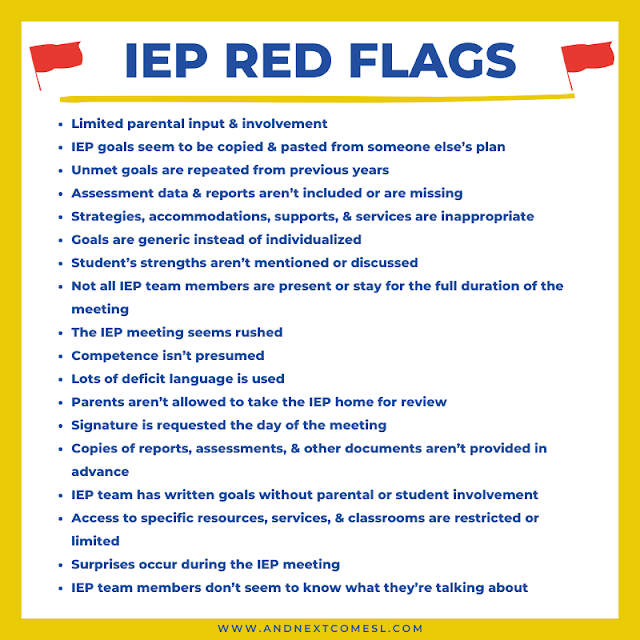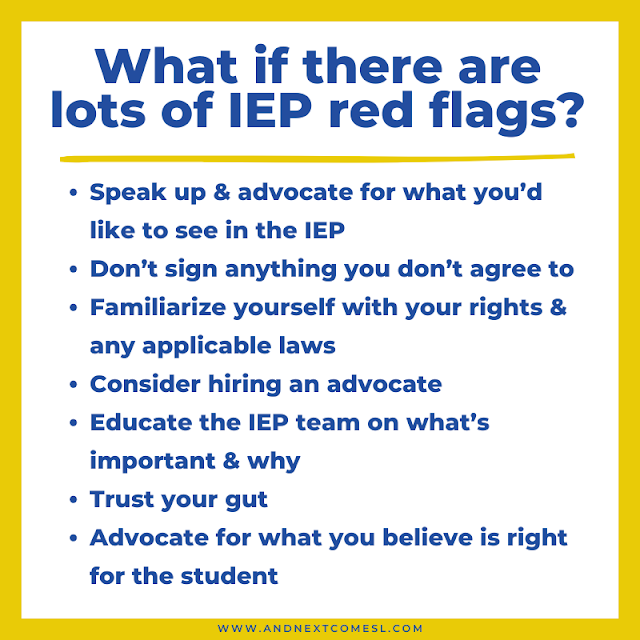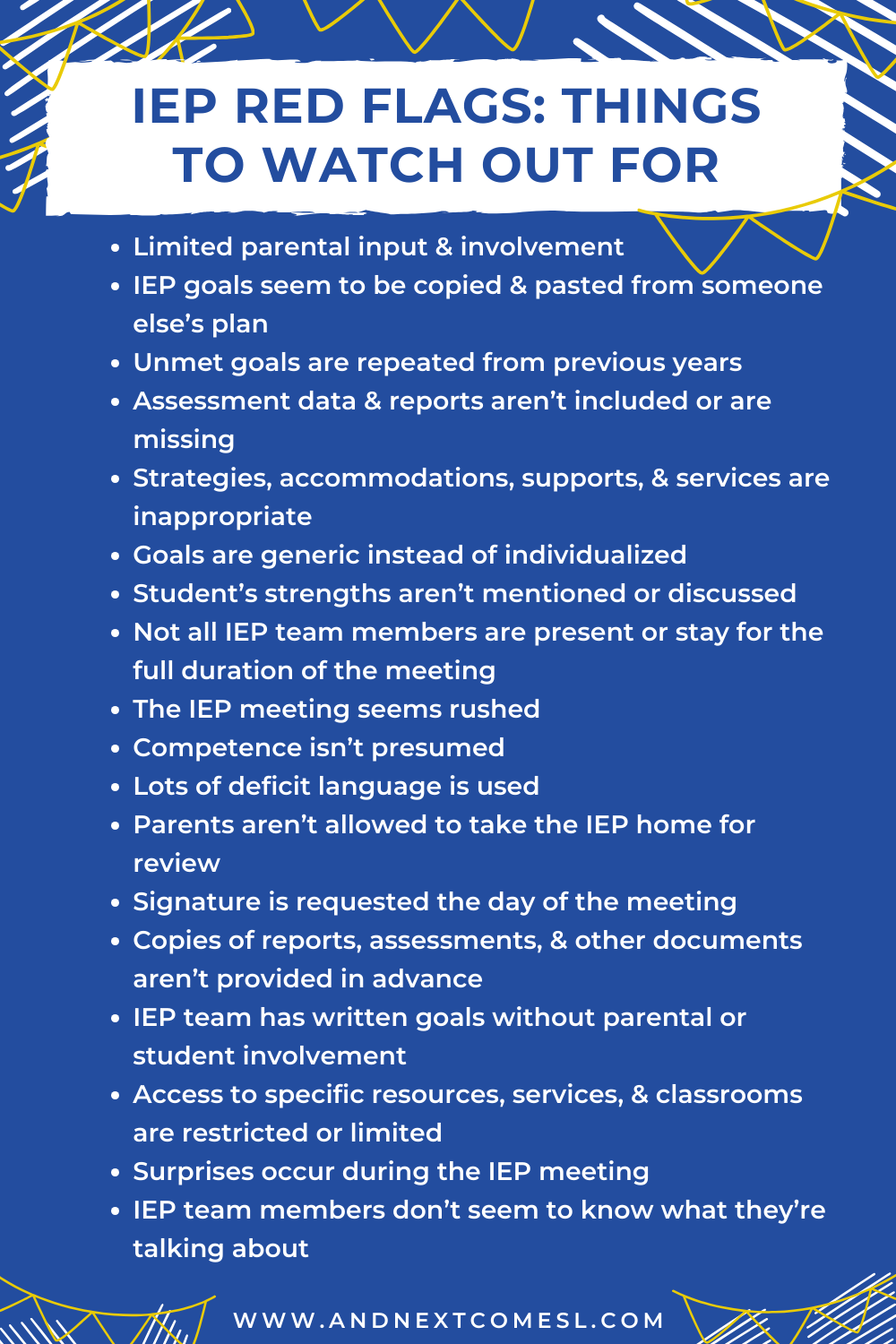When you're first getting started with IEPs, it can be hard to know what to expect or what to watch out for. Especially if you're new to IEPs.
So, sometimes it can be helpful to have a list of warning signs that you can refer to. That way you can familiarize yourself with the difference between the best IEPs and the not-so-good or crappy IEPs.
Well, that's where this list of IEP red flags come in handy.
Reviewing these before you head into an IEP meeting can be helpful, especially since some of these negative signals might be quite subtle. Others, though, will be glaringly obvious and quite hard to miss.
Below, you'll also find a list of potential IEP red flag statements that team members might use and why they can be problematic. So let's take a closer look at what you want to watch out for.
What are IEP Red Flags?
First a quick definition. An IEP red flag simply refers to the warning signs or negative things that you want to watch out for and avoid in IEPs.
They are the signs that an IEP might be poorly written, isn't neurodiversity-affirming, isn't individualized, isn't adhering to local laws and rights, and so forth.
Ideally, you want to see mostly IEP green flags (aka the positive signals), not the following IEP warning signs. However, you will usually see a mix of both.
Regardless, it's still important to keep your eyes and ears peeled for these negative signs. Some of them might appear in the written IEP document and others might be something you specifically hear during the IEP meeting. And others might be the little details or actions that you pick up on during the IEP meeting itself.
IEP Red Flags to Watch Out for
Keep in mind that there are a wide variety of potential red flags in IEPs. You might see some of these signs, all of them, some variation of the following, or even more subtle variations.
But here are some potential red flags to watch for during the IEP process:
- There is limited parental input and involvement
- IEP goals seem to be copied and pasted from someone else's plan (i.e., the name, grade, teacher, and/or diagnostic labels of the student are incorrect)
- Unmet IEP goals are repeated from previous years
- Assessment data and progress monitoring reports aren't included or are missing altogether
- Strategies, accommodations, supports, and services are inappropriate for the student
- Goals seem generic instead of individualized (i.e., they aren't specific to the student and their unique needs at all)
- The student's strengths aren't mentioned, discussed, or included
- Not all IEP team members are present or stay for the full duration of the meeting (Although sometimes things come up, school-based professionals are understaffed, etc. that make it impossible to stay for the full duration or attend. If that is communicated to parents, then it wouldn't be a red flag.)
- The IEP meeting seems rushed
- The IEP team members don't presume competence
- Lots of deficit language is used
- Parents aren't allowed to take the IEP home to review it before signing it
- The IEP team requires a signature the day of the meeting, even if the goals aren't finalized or tweaks still need to be made
- Copies of reports, assessments, and other documents aren't provided in advance
- The IEP team has outlined and written their own goals without parental or student involvement
- Access to specific resources, services, and classrooms are restricted or limited
- Surprises occur during the IEP meeting (e.g., new team members are unexpectedly present, reports you've never seen before, goals you've not discussed before, etc.)
- IEP team members don't seem to know what they're talking about (e.g., use outdated or incorrect definitions, think sensory diets refer to food diets)
Obviously, this list isn't exhaustive. There can be plenty of other signs that you might notice. Basically, if the entire IEP experience feels generic, rushed, dismissive, one sided, or inadequate, then it's probably not going to have the student's best interests in mind.
But sometimes it's not always about what is written or what the special education team does. Sometimes the red flags lie in the words that are spoken during the IEP meeting, which leads me to...
IEP Red Flag Statements: Examples of Things the IEP Team Might Say
If you're still not sure what to look for when it comes to bad IEPs, consider the following red flag statements that you might hear during the IEP writing process. Perhaps you've even heard or been told some of these yourself...
- "We don't have/do that here."
- "This is all we offer."
- "This is what we do for all students with ."
- "The teacher does this for all students."
- "We've always done it this way."
- "We use this program for all kids with ."
- "We can't provide that service."
- "It's not in our budget."
- "We don't need to reevaluate your child."
- "Your child should be on medication."
- "Your child isn't entitled to because they're in classroom or environment."
- "We don't need to include that in the IEP."
- "Division/district policy doesn't let us ."
- "That option isn't available."
- "Just sign it."
- "Since your child is doing fine academically, they aren't eligible for ."
- "We've already written the goals."
- "We know what's best."
- "Your child doesn't have the prerequisite skills for AAC."
- "We're reducing/stopping because we've decided that your child no longer needs them."
- "Your child is misbehaving/challenging/difficult so we can't move them to that other classroom/environment."
- "Let's keep this goal since they haven't made progress yet."
- "We need to get permission from first."
- "We can't do that because your child isn't grade level yet."
- "We don't have the resources to offer that."
- "We take away her AAC device."
- "We take away when they ."
- "I don't think that will work."
- "All students with get ."
- "We can't provide copies of that report."
- "We can't share that information with you."
- "We're not allowed to ."
- "We disagree so we're not going to do that."
These statements can be problematic for a lot of reasons. For instance, some of them are problematic because they outright break specific disability or IEP rights and advocacy laws.
Others on this list purely signal that the IEP isn't individualized when it should be. It should be individualized after all. It's literally right there in the name: Individualized Education Program/Plan.
Other statements might be based on incorrect assumptions (e.g., that you have to have certain prerequisite skills for AAC) or promote harmful strategies (e.g., taking away a child's only way to communicate).
And then there are others that just aren't meaningful IEP goals. Goals that certainly won't meet the student's educational needs.
Regardless, if you hear any of these types of statements during the school year, consider it a red flag for a potentially bad IEP.
So, What Should You Do if You Spot these Red Flags?
Start by speaking up. Tell them why you won't sign it or why you don't agree with what they are saying.
Share your ideas, values, and suggestions and what you would like to see in the IEP. Remember to be vocal, firm, and respectful when advocating for your child/the student. And be sure to tell them why you are asking for certain goals, services, and accommodations.
You should also familiarize yourself with what the laws are and what your rights are for where you live. Every school division/district, country, province/state, etc. will have different rules and laws that pertain to education, disability, students' rights, and so forth. So be sure to take some time to educate yourself about any applicable laws and rights.
You could also consider hiring an advocate to speak on your behalf and/or to join you at IEP meetings. They might be more familiar with the process, how to ask for particular services, what your rights and the applicable laws are, and so on.
Finally, trust your gut. If something seems off or makes you uncomfortable, don't settle. Be firm and advocate for what you believe is right for your child/the student.
A Quick Recap of Red Flags You Might See During an IEP Meeting
If you want to make the most of the IEP process, it's important to watch out for any red flags, whether they're little or big. Here are some things to keep in mind:
- IEP red flags are the negative things or warning signs that tell you that an IEP might be poorly written, isn't neurodiversity affirming, isn't individualized, and/or even a good fit for your child or the student.
- Some IEP red flags can include a lack of collaboration and parental input, generic non-specific strategies, lots of deficit language, limited access to specific resources or services, continuing on with goals from a previous IEP, and a pressure to sign the IEP without proper review.
- You should also watch out for IEP red flag statements such as "We don't do that here" or "This is all we offer."
- Remember to speak up, familiarize yourself with laws, educate those around you about your values and your child's strengths, consider hiring an advocate, and always trust your gut when it comes to IEPs.
- Don't sign anything you don't agree with, especially if there are a lot of red flags.
Now that you are familiar with some potential IEP red flags, it might be helpful to read through this list of IEP green flags. That way you also know what a good solid IEP looks like.









